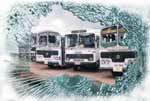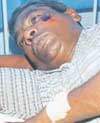Rampage on the roads A spate of tragic accidents and the aftermath of mob violence highlight the breakdown of law and order on the highway, reports Kumudini Hettiarachchi Revive
National Council for Road Safety
With members from the fields of transport, highways, education,
finance and planning, provincial government, University of Moratuwa,
UDA, RDA, National Transport Commission, Department of Motor Traffic,
Sri Lanka Transport Board, Ceylon Society for the Prevention of
Accidents, Automobile Association, Police Department, CMC and Controller
of Insurance, it was set up to find immediate solutions to urgent
problems. "When the Transport and Highways Ministry was bifurcated
the Council fell into abeyance," said Cecil Amerasinghe, Secretary,
Ministry of Defence, Transport and Highways. He assured that it would be revived soon with wider representation, even bringing in civil society and other NGOs as observers. Seven
people killed in private bus accidents in two weeks. An old woman
crossing the road at Delkanda is knocked down by a private bus.
Two small, motherless girls returning home with bread from the nearby
boutique are run over by a private bus in Wariyapola. A middle-aged
woman taking her daughter for classes is crushed by a private bus
at the Nugegoda Junction. The list goes on and on.
The
accidents are heart-rending but an unemotional check of the statistics
shows no major change in the number of road mishaps within the past
five years. Figures reveal that a person is killed every day by
a private bus. Accidents are
bad enough but a terrifying dimension has now crept in to make matters
worse. The chilling aftermath of mob violence, on a scale never
seen before. "I didn't
run over the old woman. I stopped the bus but it just struck her
and she got thrown. I also didn't run away but got down to help
her immediately, but see what happened to me," says Sirimal
Wijeratne touching his face gingerly to indicate swellings. Sirimal, 42,
who was in the Kalubowila Hospital when we met him, was the driver
of the private bus which was involved in the accident in which the
old woman died on Poson night at Delkanda. That night he was driving
a 43-seater. It was his sixth and final run from Kottawa to Colombo
and the bus was full, with around 10 passengers standing. A driver for
22 years, he claims he has never even had a minor accident before
this. "It was poya night and there were few buses on the road.
As I was taking the incline close to the pola, there was a perahera
on one side and two or three women with small children attempting
to cross the road recklessly. I tooted the horn, braked and asked
them whether they were trying to put us into trouble. I was on first
gear and just changed into second and had hardly any time to pick
up when an achchi jumped onto the road. I stepped on the brake,
but she got pushed and fell in front of the bus. If I was speeding
I would have run over her." He then did
what any human being should do. "I wanted to help her. She
was alive when I got to her." But things happened quickly,
with about 20-30 people, mostly men gathering around him. The blows
rained down. He heard shouts of "Umbala thama me vidiyata mini
maranne" (This is how you murder people). He woke up later
in hospital to hear that "bus eka kudu karala" (Bus had
been smashed). How is it that
a gentle and tolerant people, who usually will not harm a fly suddenly
change face and become stone and stick wielding rioters? "It happens
when there is a feeling of inadequacy. The law doesn't function
effectively. People feel there is no immediate and proper punishment
of culprits, be it an accident, a rape or any other crime. Another
factor has been a lot of interference, mainly political and also
from the higher social and economic circles," explains well-known
sociologist Professor Nandasena Ratnapala. A crucial thing
has also been that people are not educated enough, to be socially
controlled, he stresses, adding that those days the learning process
came from the family, school and religion. "Now these systems
have broken down." Chiding the
media, especially the electronic media, Prof. Ratnapala charges
that sometimes they bring non-essentials into focus. This has a
bad impact on people particularly children. "Violence, crime
are the main focus. Guns and blood. In an accident if they extol
how people acted and what motivated them to do so in one place,
people react the same way in another place." How true the
copy-cat syndrome rings. For the Nugegoda spree of violence, where
27 buses were badly damaged was soon followed by young students
in Galle. "This
trend of mob violence is only within town limits," says Gemunu
Wijeratne, President of the Lanka Private Bus Owners' Association.
Why? Mostly because many people gather in towns and one can also
see the hand of students behind it. He recalls that earlier there
have been only two incidents near the Colombo and Kelaniya campuses
where buses were burnt when two students were run over. Mr. Wijeratne
also blames the authorities for rousing public hostility against
the private bus service. "In the recent tussle between the
authorities and the private bus owners, they highlighted only the
fact that we wanted to increase bus fares and the media too got
on the bandwagon. When raw materials go up in price, doesn't the
price of the product also go up?" he asks, stating that no
one talks of the rise in diesel prices. The bus owners wanted a
national policy and set a deadline. The demand was that if it was
not brought in, bus fares would be increased by 30%. But the authorities
painted them as 'Shylocks' and got passenger organizations to question
them strongly. "The people got angry with us," he says.
Do you know
that there are 50% more buses than required in the Western Province?
We are doing a service but at the same time the bus industry has
to put up a real fight to survive. We too need to live, Mr. Wijeratne
says. However, Prof.
Ratnapala holds the view that all segments of society have to share
the blame. "What
should happen is the law must take its course. But take for example,
the case of an assault on a bus crew member. Without letting the
police handle the issue, the buses people go on strike. Even doctors
do the same. People feel the law is not working." He sees four
causes for accidents - lack of trained bus drivers; lack of social
training for bus drivers, like how to handle people; inadequate
punishment for offences and the public not being educated on road
safety and rules. "Police
records indicate that in 1996 there were 140,000 who drove vehicles
without licences. "What
is required is for the police to take the vehicle of such errant
drivers and not release it. With regard to social training for bus
drivers, they need to be given at least a week's training, ideally
three months before a bus is handed over to them. Punishment for
errant drivers should be more stringent and even caning in public
should be introduced," he says. The Police,
however, stress that they are doing their job well, but there are
many incompetent drivers on the road. "The law is weak and
needs to be strengthened," says Director of Traffic SSP S.M.
Wickremasinghe. The finest examples are the spot fines for errant
driving which do not exceed a low Rs. 200. "Driving without
a licence gets only Rs. 150; for under-age driving it is Rs. 150
and for dangerous, parallel driving or wrong overtaking it is only
Rs. 100." If you take
a random sample most of them are driving with temporary permits.
Last year of the over one million (1,040,000) traffic offence charges,
140,000 were against private buses, he said, questioning the competency
of drivers coming through driving schools. Many things
need to be done while the Police are doing their job. "Even
pedestrians are indisciplined on the road. There is a need to recheck
driver competency. What we need is a national level strategy,"
he added. Whatever the
reasons, mob violence has raised its ugly head. Will we come to
a stage when like in America during the time of the slaves the blacks
were considered guilty of all heinous crimes, irrespective of whether
there was evidence or not and the chant was: lynch them, hang them? In this country
where any person is deemed innocent until proven guilty, should
we allow summary justice to be the order of the day? Where are the
voices of reason and the rights activists? Why is civil society
silent? Passing through
Nugegoda soon after the mob had been brought under control, one
could see the hate and pent- up hostility of the youth crowding
the junction. The system should immediately be put right before
it spills into all spheres of life sending a clear message that
Nugegoda and Galle should never be repeated again. Otherwise, as driver Sirimal said nursing his injuries, "Api asarana wuna", the country too would gradually sink into anarchy. Let justice prevail through the courts of law and not the kangaroo courts manned by mobs.
He attributes mob violence to the indiscipline of everyone, not
only the drivers but also pedestrians. "In every accident the
driver is not at fault. All parties must be checked. The police
should enforce the law, politicians shouldn't interfere. We need
to recommend, within the existing law to suspend the driving licences
of bad drivers pending investigation."
Police are also educating the drivers and the public including schoolchildren
on road safety and policemen in mufti are being deployed to spot
errant drivers, he said.
Meanwhile, Motor Traffic Commissioner E. Jinadasa says a thousand
people apply for driving licences each day and about 750 who have
the basic competency are granted licences. The annual tally works
out to about 180,000 new licences. Forty percent of these are for
heavy vehicles. "We look for the usual requirements, but we
cannot make professional drivers. People become professional drivers
only after gaining four or five years of experience." He gives a word of advice to the Private Bus Owners' Association. "Check the validity of the driving licence of the person whom you are employing and then like in the security forces give them some training in handling heavy vehicles before putting them in charge of people's lives." |
||||||
Copyright © 2001 Wijeya Newspapers
Ltd. All rights reserved. |

 body
set up in 1998 to ensure the quick sorting of problems?
body
set up in 1998 to ensure the quick sorting of problems?